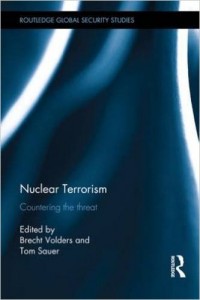Nuclear Terrorism – Book published
Nuclear Terrorism: Countering the Threat
Routledge, 262 pages
About the Book
This volume aims to improve understanding of nuclear security and the prevention of nuclear terrorism.
Nuclear terrorism is perceived as one of the most immediate and extreme threats to global security today. While the international community has made important progress in securing fissile material, there are still important steps to be made with nearly 2,000 metric tons of weapons-usable nuclear material spread around the globe. The volume addresses this complex phenomenon through an interdisciplinary approach: legal, criminal, technical, diplomatic, cultural, economic, and political. Despite this cross-disciplinary approach, however, the chapters are all linked by the overarching aim of enhancing knowledge of nuclear security and the prevention of nuclear terrorism. The volume aims to do this by investigating the different types of nuclear terrorism, and subsequently discussing the potential means to prevent these malicious acts. In addition, there is a discussion of the nuclear security regime, in general, and an important examination of both its strengths and weaknesses. In summary, the book aims to extend the societal and political debate about the threat of nuclear terrorism.
This book will be of much interest to students of nuclear proliferation, nuclear governance, terrorism studies, international organizations, and security studies in general.
Table of Contents
1. Introduction, Brecht Volders and Tom Sauer
2. The nuclear threat: a two-level analytical framework to assess the likelihood of nuclear terrorism, Brecht Volders
3. Internal dynamics of a terrorist entity acquiring biological and chemical weapons, Jean Pascal Zanders
PART I: Preventing Radiological Terrorism
4. Promoting alternatives to high-risk radiological sources, Miles Pomper and Aaron Gluck
5. Time for a convention on radiological security?, Sylvain Fanielle and Piotr Andrzejewski
6. The threat of a self-sustained chain reaction device, Ivan Andryushin, Eugeny Varseev and Gennady Pshakin
PART II: Preventing Attacks on Nuclear Facilities
7. Attacking nuclear facilities: hype or genuine threat?, Gary Ackerman and James Halverson
8. Nuclear security in Belgium: evolution and prospects, Rony Dresselaers and Sylvain Fanielle
PART III: Preventing the Detonation of a Crude Nuclear Device
9. Searching for the nuclear silk road, Steve Sin and Marcus Boyd
10. Securing Pakistan’s nuclear arsenal: the threat from within, Pervez Hoodbhoy and Zia Mian
PART IV: Nuclear Security Governance and Culture
11. Nuclear security culture: from concept to practice, Igor Khripunov
12. Nuclear security commitment making: results of the summit process, Michelle Cann
13. Nuclear security diplomacy beyond summitry, Trevor Findlay
14. Conclusion, Tom Sauer and Brecht Volders
